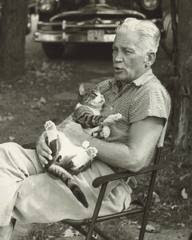Stuart Chase
Stuart Chase (March 8, 1888, Somersworth, New Hampshire - November 1985) was an American economist and engineer trained at MIT. His writings covered topics as diverse as general semantics and physical economy. His hybrid background of engineering and economics places him in the same philosophical camp as R. Buckminster Fuller. Chase's thought was shaped by Henry George, Thorstein Veblen and Fabian socialism.Chase spent his early political career supporting "a wide range of reform causes: the single tax, women's suffrage, birth control and socialism." Chase's early books The Tragedy of Waste (1925) and Your Money's Worth (1928) were notable for their criticism of corporate advertising and their advocacy of consumer protection. Although not a Marxist, Chase admired the planned economy of the Soviet Union, being impressed with it after a 1927 visit. Chase stated that "The Russians, in a time of peace, have answered the question of what an economic system is for". It has been suggested that he was the originator of the expression a New Deal, which became identified with the economic programs of American president Franklin Delano Roosevelt. He had a cover story in The New Republic entitled "A New Deal for America", during the week that Roosevelt gave his 1932 presidential acceptance speech promising a new deal, but whether Roosevelt's speechwriter Samuel Rosenman saw the magazine is not clear.
 His 1938 book The Tyranny of Words was an early (perhaps the earliest, predating Hayakawa) and influential popularization of Alfred Korzybski's general semantics.
His 1938 book The Tyranny of Words was an early (perhaps the earliest, predating Hayakawa) and influential popularization of Alfred Korzybski's general semantics.Chase supported the isolationist movement and was against US entry in World War II, advocating this position in his 1939 book The New Western Front. In the 1960s, Chase lent his support to the Johnson administration's Great Society policies.





